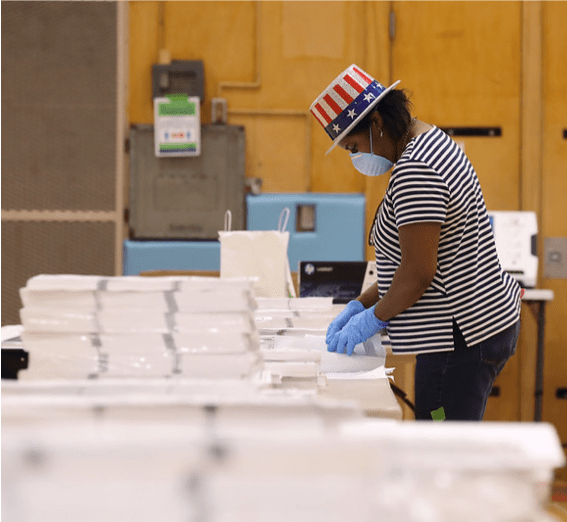RESEARCH QUESTION
Policy Lab will undertake a year-long analysis of state and federal disrupted elections policy. Based on an analysis of these laws we will work toward a policy report that will outline policy alternatives to create a consistent and uniform law for protecting the integrity of federal elections during emergencies.
BACKGROUND
While conducting elections is primarily a state authority under the US Constitution, states share this authority with the US Congress. States are empowered to set “Times, Places, and Manner” of holding federal elections, but Congress may “make or alter” these state regulations (Art. I, Sec. 4). Congress is also responsible for determining a uniform day to count electoral votes and certify the presidential election (Art. II, Sec. 1). And according to the Twentieth Amendment all congressional elections must be certified by January 3rd, and the presidential election completed by January 20th.
Congress has the power, by changing the appropriate statutes, to change the general election date and as well the dates electoral votes are received in Washington and counted in Congress.[1] Despite having these powers over elections,  Congress generally has not addressed election disruptions in law, and no federal election statute is devoted specifically to the topic.[2] This may derive from a principle of federalism that states and localities should be primarily responsible for the conduct of elections. Whatever the cause, in the absence of federal regulations there has been a proliferation of state laws dealing with disrupted elections. According to the National Conference of State Legislatures, “At least 45 states have statutes that deal with Election Day emergencies in some way, though there is little consistency between states on what events would be covered and exactly what plans will be followed in each emergency.” This situation creates an unclear and potentially volatile legal environment that threatens the integrity of federal elections, particularly if there should be a national emergency like a pandemic.
Congress generally has not addressed election disruptions in law, and no federal election statute is devoted specifically to the topic.[2] This may derive from a principle of federalism that states and localities should be primarily responsible for the conduct of elections. Whatever the cause, in the absence of federal regulations there has been a proliferation of state laws dealing with disrupted elections. According to the National Conference of State Legislatures, “At least 45 states have statutes that deal with Election Day emergencies in some way, though there is little consistency between states on what events would be covered and exactly what plans will be followed in each emergency.” This situation creates an unclear and potentially volatile legal environment that threatens the integrity of federal elections, particularly if there should be a national emergency like a pandemic.
The widespread disruptions to the 2020 election cycle caused by the COVID-19 global pandemic have exposed the need for federal law to address disrupted elections in a clear and consistent manner. Primary elections in Ohio, Wisconsin, and other states were negatively impacted by the lack of planning, resources, and a legal framework for addressing extraordinary circumstances like a pandemic. There may yet be more difficulties ahead during the general election in November, depending on how the pandemic develops. These consequences could include depressed voter turnout, severely delayed and or indecisive election results. These disruptions cut to the core of American democracy and threaten the security and stability of our institutions.
[1] Scott Bomboy, “Does the Constitution allow for a delayed presidential election?” National Constitution Center, April 10, 2020.
[2] R. Sam Garrett, “Disrupted Federal Elections: Policy Issues for Congress,” Congressional Research Service, March 20, 2020
Project Partner: Kevin Kosar, Resident Scholar, American Enterprise Institute
Faculty: Zachary Courser, Co-Director; Eric Helland, Co-Director
Research Assistants: Policy Lab Class Fall 2020
Lab Managers: Vera Kratz and Scott Mowat

